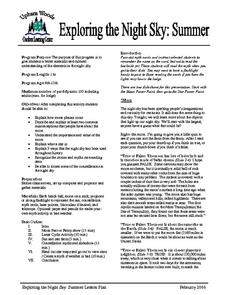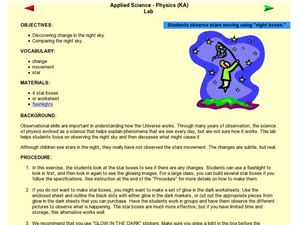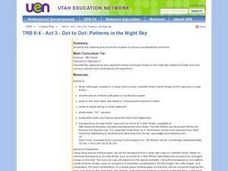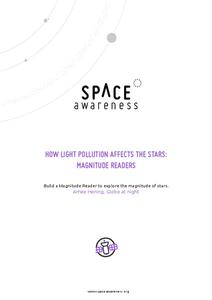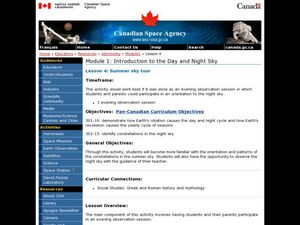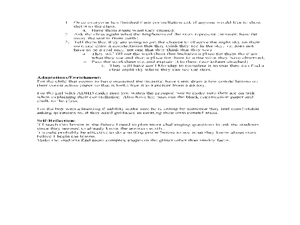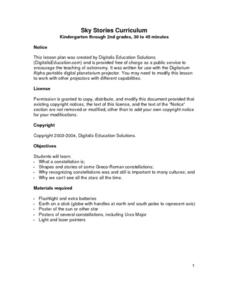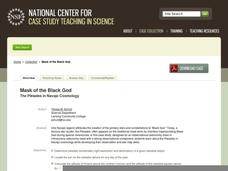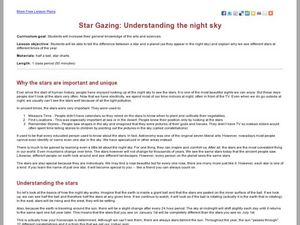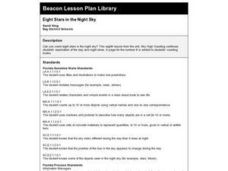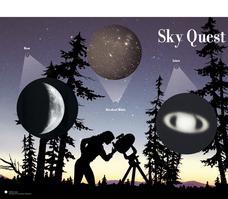Curated OER
Exploring the Night Sky: Summer
Students explain how moon phases occur. They describe and explain at least two common misconceptions that people have about the moon. Students explain what a star is. They explain 3 ways that the night sky has been used throughout history.
Curated OER
Night Sky Observation
Students explore space science by completing an observational worksheet. In this astronomy lesson, students view several worksheets in which students identify minor changes between separate images in preparation for real star...
Curated OER
An Introduction to the Night Sky and Movement Astronomy
Basically, this is an interactive exploration of educational astronomy software and an app. Young astronomers discover how the apparent motion of the sky relates to Earth's movements and the position of the observer. It is out of this...
Curated OER
Sky Watching
Students explain how our knowledge of the sky has been enhanced by telescopes. They make their own night-sky observations, diagram and describe what they see, and examine pictures taken by telescopes.
Curated OER
Sky Watching
Students complete night-sky observations to understand how our knowledge of the sky has been enhanced by telescopes. Students complete a timeline worksheet giving the history of telescopes. Students then then make their own observations...
Space Awareness
Make a Star Lantern
Go star-gazing with young learners! They study the history, origins, and patterns of constellations in an activity that explores the starry night sky.
Curated OER
Dot to Dot: Patterns in the Night Sky
Sixth graders are introduced to several major constellations and locate them in the night sky. They graph the constellations on grid paper and work in groups to research common myths and stories associated with specific constellations.
Curated OER
Banner of Stars
Young scholars create a motivational star banner to inspire the writing of poetry. As a class they read poems, songs, and quotes about stars and night skies, view and discuss "Starry Night" by Vincent Van Gogh, then create a star banner...
Curated OER
Introduction to the Day and Night Sky
Students explore space science by participating in a sky observation activity. In this astronomy activity, students define a list of astronomy vocabulary terms and examine star charts of the four seasons. Students gather with their...
Space Awareness
How Light Pollution Affects the Stars: Magnitude Readers
Did you know light can decrease visibility? Light pollution absolutely makes it more difficult to see stars. Scholars build a simple magnitude reader to determine the magnitude of stars. They use these data to estimate the impact of...
Curated OER
Exploring the Night Sky: Fall/Winter
Students explain how moon phases occur. They explain three ways that the night sky has been used through history. Students locate some of the constellations in the night sky. They discuss stories and myths surrounding stars.
Curated OER
Night Sky
Pupils discover why stars can only be seen at night. They participate in a read aloud of, "Night Sky" by Carole Stott and, "Switch on the Night" by Ray Bradbury. Using the sky objects described in the readings, they brainstorm and list...
Curated OER
Summer Sky Tour
Young scholars explore space science by participating in a constellation identification activity. In this astronomy lesson, students view star charts based on the different seasons and define a list of astronomy related terms. Young...
Curated OER
Size of Stars
Fifth graders draw constellations in the sky and use the brightness levels of stars to show how big they are. In this constellations lesson plan, 5th graders describe what they see in the night sky by discussing the star's distances.
Space Awareness
Star in a Box
What happens to stars as they get older? A simulation takes pupils through the life cycle of stars based on their masses. The resource introduces the Hertzsprung-Russell diagram and the common relationships and life cycle patterns observed.
Curated OER
Star Count
Fourth graders explore the night sky with their star counter. They to determine the types of stars and the number that can be seen from their local area and share their data via the Internet. They participate in NASA online projects.
Curated OER
Sky Stories
Students are introduced to the branch of science known as astronomy. They discuss stars and constellations and then view the night sky using a portable digital planetarium projector. They identify a variety of constellations and...
Curated OER
Star Quest
Learners review the concepts of the branch of science known as astronomy. They discuss stars and constellations and then view the night sky using a portable digital planetarium projector. They identify a variety of constellations using a...
National Center for Case Study Teaching in Science
Mask of the Black God
Finally, an astronomy lesson for the high schooler! Explorers are able to read star maps for finding objects in the night sky by determining celestial coordinates. In particular, they locate the Pleiades and read about a Navajo legend...
Curated OER
Star Gazing: Understanding the night sky
Students observe star charts to understand the difference between a star and a planet. For this star lesson plan, students also explain why we see different stars at different times of the year.
Curated OER
Eight Stars in the Night Sky
First graders explore the day and night sky. They complete a number 8 page for their counting books.
Starry Night Education
The Stars
Three astronomy activities in one resource! Here you will find one hands-on activity, one demonstration, both with discussion questions, and one activity worksheet. During these lessons young scientists discuss how stars are...
Curated OER
The Night Sky
Third graders develop questions they have about the solar system. After being read a book, they view and discuss different constellations in the sky. In groups, they are given a piece of butcher paper and glow in the dark crayons in...
Curated OER
Sky Quest: Exploring the Constellations
Students examine constellations and planets through completing various activities. Students work individually and in groups to create drawings based on stars, compare and contrast the night sky with and without a telescope and learn...
